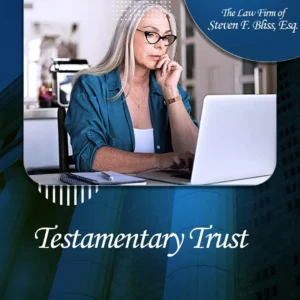What Is A Testamentary Trust?
Testamentary Trust
Listen to this Article on:
Using a Last Will & Testament to create a trust.
Why Would I Want A Testamentary Trust? There is considerable hype, much of it well-deserved, given to the practice of using trusts to avoid probate. When one creates a trust to avoid probate, he will usually draft a living trust or, in some circles, an inter vivos trust. This trust takes effect immediately once the ink dries on the legal documents.

However, some people in California may opt for a testamentary trust. As the name implies, a testamentary trust gets created by one’s Will. In other words, the trust only exists once a person dies and their Will gets admitted into the probate court.
The testamentary trust will not allow an estate to avoid probate altogether. However, the testamentary trust does offer some advantages. For example, it can protect from debt collectors and can also, in some cases, allow an estate to save on its estate taxes.
Another significant advantage that a testamentary trust offers is the ability for a person to control better how her beneficiaries will receive and spend their inheritances. For example, a testamentary trust can require that an executor only pay a younger beneficiary so much of his inheritance over time instead of turning it over in a lump sum when he is inexperienced or irresponsible in financial matters.
On the other hand, because a testamentary trust does not go into effect until after a person dies, she can continue to use her money and property without worrying about conducting business through the trust.
Please Help Us Spread The Word By Giving Us a 5 Star Rating on This Article
Free Initial Consultation with
Steven F. Bliss Esq.

★ ★ ★ ★ ★

Likewise, if he changes his mind and decides he does not want trust at all, a simple trip to the attorney’s office to revise his Will is all that a person will need.
Testamentary trusts can be a good option for a California resident trying to plan her estate. These estate planning devices can be discussed with an experienced attorney handling wills and trusts.
10 Things You Should Know About a Testamentary Trust. A testamentary trust can ensure that children or others who need help managing the proceeds of your Will are protected.
With so many types of trusts out there, you might be wondering what sets a testamentary trust apart from the rest.
Below you’ll find answers to commonly asked questions regarding the testamentary trust.
1. What Is a Testamentary Trust?
A testamentary trust is a trust contained in a last will and testament.
It provides for the distribution of all or part of an estate and often proceeds from a life insurance policy held on the person establishing the trust.
There may be more than one testamentary trust per Will.
2. Who Are Testamentary Trusts Created For?
Generally, testamentary trusts are created for young children, relatives with disabilities, or others who may inherit a large sum of money that enters the estate upon the testator’s death.
3. How Is a Testamentary Trust Created?
A testamentary trust is provided for in a last will by the “settlor,” who appoints a “trustee” to manage the funds in the trust until the “beneficiary,” or person receiving the money, takes over.
4. When Is a Testamentary Trust Created?
The trust kicks in after the probate process after the person’s death who has created it for their children or others.
Note: This differs from “inter vivos” trusts created during the settlor’s lifetime.
5. How Long Does a Testamentary Trust Last?
A testamentary trust lasts until it expires, provided for in its terms. Specific expiration dates maybe when the beneficiary turns 25 years old, graduates from university, or gets married.
6. What Is the Probate Court’s Role in a Testamentary Trust?
From the time of the settlor’s death until the expiration of the testamentary trust, the probate court checks upon the trust to make sure it is being handled properly. Legal fees could add up depending on how long this time frame lasts, so this should be considered when deciding whether to opt for a testamentary trust.
7. Who Can Be the Trustee of a Testamentary Trust?
The person creating the trust may choose anyone, but it should be someone the person trusts to act in the children’s best interests or others receiving the trust funds. If, for any reason, the person chosen declines to take on the responsibility of a trustee, someone else may volunteer, or the court will appoint a trustee.
8. Must the Trustee Honor the Terms Set Out for Expenditures in the Will?
Not necessarily, so the settlor must choose someone trustworthy.
9. When Does it Make Sense to Opt for a Testamentary Trust?
Generally, suppose the person’s estate is small compared to the potential life insurance proceeds or other amounts paid to the estate at death. In that case, a testamentary trust may be advisable.
10. How Much Does It Cost to Set up a Testamentary Trust?
It is generally inexpensive to include testamentary trust provisions during will preparation.
